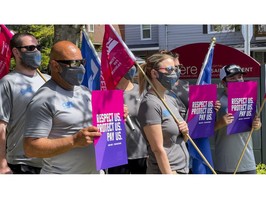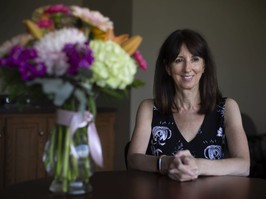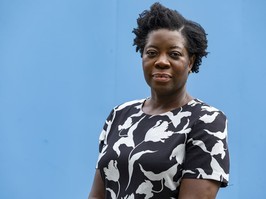two quebec nurses fired after racism allegations
the cisss de lanaudière announced on tuesday it has fired two nurses at the clsc de joliette who allegedly mocked an indigenous woman last friday.
we apologize, but this video has failed to load.
try refreshing your browser, or
tap here to see other videos from our team.
tap here to see other videos from our team.
by: montreal gazettetwo nurses at a clsc in joliette were fired on tuesday following an investigation into an allegation by an atikamekw woman that they mocked her and treated her with disdain, the local health and social services agency announced late tuesday.the cisss de lanaudière said it launched an internal investigation after the woman went public with her allegation of racism. the two employees were initially suspended without pay. they were met with on tuesday to hear their side of the story, the cisss said in a press release. in the afternoon, the cisss fired the two, it said.“i remind you how unacceptable discriminatory, racist and intimidating behaviour is,” caroline barbir, interim president and general director of the cisss de lanaudière, said in the statement. “it must be denounced and condemned. anyone who calls on the care and services offered in the facilities of the cisss de lanaudière has the right to feel confident.”the incident occurred six months after joyce echaquan filmed staff at a hospital in joliette, about 70 kilometres northeast of montreal, showering her with racist insults hours before she died.on friday, jocelyne ottawa, 62, went to the local health clinic in joliette to have a bandage changed on her foot. she alleged afterward that two nurses said upon seeing her name: “we’re going to call you joyce, for short.” they also asked her if she could sing them a song in atikamekw, she said.“the comments made by the two dismissed employees testify to a breach of the code of ethics of the nursing profession, of the code of ethics and values of the organization,” barbir said in the statement. the cisss has a zero-tolerance policy for racist, discriminatory and intimidating behaviour, it added.the details of the internal investigation remain confidential, the statement said, adding that no media interviews would be granted.barbir said the regional health authority would continue to work with the manawan atikamekw community so “the necessary measures of cultural safety of indigenous communities be respected.”the two nurses in question, who had more than 10 years of experience, were among 4,200 employees of the cisss who followed a cultural safety conference before the incident.quebec health minister christian dubé praised barbir’s actions, saying “we acted quickly” in the case. “i greatly appreciate the rigour which which barber acted this afternoon.”he said culture “doesn’t change with one training session” and it would take more, along with “other things, many other things to be capable of changing, but we’ll continue and i think the message is starting to get through that we won’t tolerate this.”a more elaborate training has been prepared by the université du québec en abitibi-témiscamingue, but it is awaiting approval by the atikamekw community.earlier tuesday, a national indigenous women’s organization called for a full investigation into the conduct of the two nurses. the native women’s association of canada said it was outraged by the incident.“we know this sort of thing goes on,” nwac president lorraine whitman said in a statement “still, it is shocking that health-care professionals would behave in such a blatantly and openly racist manner so soon after the condemnations that followed the release of joyce echaquan’s video.”“we need a full-scale investigation.”paul-emile ottawa, chief of the manawan atikamekw council, described the incident as “unacceptable” and called on the province to adopt a document called “joyce’s principle,” which is a series of policies aimed at ensuring equitable access to health services for indigenous people. the document was developed by the council and by the council of the atikamekw nation.those recommendations were rejected by the provincial government in november because joyce’s principle makes reference to “systemic racism.” benoit charette, appointed as quebec’s minister responsible for the fight against racism in february, has denied the existence of systemic racism in quebec.ottawa said without that recognition, indigenous people will continue to face discrimination in the province’s health-care system.“we can see again that piecemeal solutions will not change the situation, a systemic problem requires a systemic approach,” he said monday in a statement.the native women’s association said indigenous people frequently have negative experiences in health-care settings.“indigenous patients regularly experience abusive treatment, negative stereotyping, substandard care, and an overall sense of feeling unwelcome within health-care settings,” whitman said. “as a result, we are reluctant to seek treatment, even when we know it is necessary.“in practice, this means indigenous people have significantly worse health outcomes than non-indigenous people.”
 3 minute read
3 minute read





